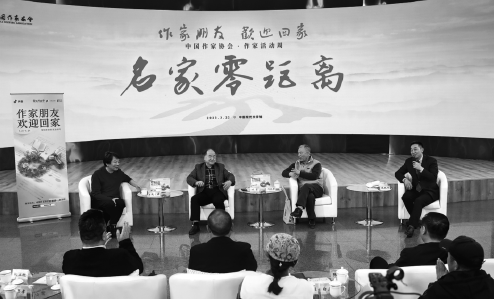Taking a page out of their books
Noted authors proffer wisdom to budding writers at a seminar in Beijing as part of a program to support grassroots literature development, Fang Aiqing reports.

Nobel laureate Mo Yan believes that every writer, no matter how influential they are, shares a similar course of growth, starting as a reader and literary enthusiast.
They encounter something they are really into and itch to try their hand at writing, imitating first, before eventually forming a style of their own, he says.
Mo Yan was sharing his memories of the days when he first picked up his pen, with 36 grassroots writers from around the country, at a seminar in Beijing on March 22.
The panel also included Liang Xiaosheng and Liu Zhenyun, whose works — many of which have been adapted into TV series and films — have reached a multitude of readers at home and abroad.
"I've experienced how literature appeals to a man in his youth and how its power manifests," Mo Yan said, nostalgic for an age when a literary boom saw young people flock to writing with dreams of seeing their words in print.
He recalled his days in the army in Baoding, Hebei province, giving lessons on Marxist philosophy, political economics and scientific socialism during the day, and writing at night.
Every day he waited for the sound of the postman's motorcycle, hoping it would bring good news. His effort paid off when, in May 1981, a local bimonthly literature magazine decided to publish his maiden work, an epistolary short story about a newly married wife missing her husband, who was garrisoned on an island, on a spring night.
Mo Yan then struggled for a while, before he figured out that his rural hometown in Shandong province — the prototype for the fictional Dongbei (Northeast) township of Gaomi that features in his works — and a place he's most familiar with, would provide an inexhaustible source of writing material. Every acquaintance could be a vivid character in that literary and geographic space.
He said that he has turned the obsession for novelistic art into a major part of his life.
"The most sensitive nerves of mine are all about literature. I would associate a certain event, sentence, story or a human face with literature and transcribe it into words," he said.
For Liang, someone's early reading experiences are key to their later cultivation of a literary concept. The stories Liang's mother told him in childhood, poems of Wen Yiduo (1899-1946) and Yin Fu (1910-31) in his sibling's Chinese-language textbooks, Maxim Gorky's novels, and the lectures he listened to in the army, all nourished his literary roots.
In his writing, whether it's a novella or full-length novel, Liang tends to prioritize portraying the characters rather than simply describing certain events. In his decadeslong career, he has formed the habit of conceiving characters before writing the story.
Even when he watches TV series, films and theater dramas — which he believes are derived from literature — he will drop out if the plot unfolds with the pace of events instead of revealing more about the characters and their corresponding social backgrounds.
Such a tendency largely stems from his early life experience at the Beijing Film Studio as a literature editor, after graduating from Shanghai-based Fudan University in 1977.
Liang's full-length novel A Lifelong Journey — which won the Mao Dun Literature Prize, among the field's most prestigious awards in China — was adapted into a hit series and raised heated discussions online last year.
Liu adds to Liang's idea further by stating the importance of characters' interpersonal relationship and its structure, saying it requires wisdom, creativity, and philosophical cognition to achieve that in a literary creation.
He took prominent writer Lu Xun (1881-1936) as an example. In his writing, Lu Xun created household characters like Kong Yiji, Sister Xianglin and Ah Q. Liu said that contemporary writers of Lu Xun's time saw the world from a local point of view, while Lu Xun looked at his village from a global perspective.
Liu's best-sellers, including Someone to Talk To, The Cook, the Crook, and the Real Estate Tycoon, I Did Not Kill My Husband and Tapu Township, have made their way to the international market and won him such titles as the Chevalier de l'Ordre des Arts et des Lettres, given by France's culture ministry.
Reviewing his previous works, Liu said he feels a sense of regret. "Not because I didn't try my best, but that I was incapable of doing it better at the time." However, he said, realizing something is wrong with previous works is the impetus for creating the next.
He noted that literature emerges where philosophy stops exploring and fails to explain.
The day before the seminar with Mo Yan, Liang and Liu, 89-year-old Wang Meng, former minister of culture, shared with the grassroots writers the wisdom he gained from his seven-decade writing career, stressing the importance of curiosity and a passion for real life, describing it as the evergreen tree of creation.
The exchange between literary veterans and emerging grassroots authors was highlighted throughout a 10-event program, which was hosted by the China Writers Association in Beijing in March.
During the program, the grassroots authors also visited an exhibition on 20th-century modern Chinese literary history, and gathered to discuss with influential book editors from multiple publishing houses and literature journals about how to improve workflow from both sides and potential cooperation opportunities.
The quarterly program is designed to help the association build close relationships with grassroots writers and literary organizations, encouraging and supporting their writing about China and Chinese people in the new era, according to Zhang Hongsen, Party secretary of the association.
Zhang said the association is endeavoring to discover talented writers and quality works, in the hope that the network of writers associations at different levels can be a bridge connecting authors from various walks of life with wider society, encouraging them to shoulder more social responsibility.
Sonam Tsering, born into a nomadic Mongolian family and a laureate of the prestigious Lu Xun Literature Prize last year, said he has personally benefited from the association's two programs to support literature development among ethnic groups, and has studied at the Lu Xun Institute of Literature under the China Writers Association for four months, during which he has made noticeable progress.
Fan Yusu, a babysitter and writer who lives in Picun village, a migrant workers' community in suburban Beijing that is known for its literary atmosphere, said literature offers people at the grassroots, like her, a greater sense of dignity and the ability to enjoy a spiritually enriched life. She hopes the association will promote the establishment of more culture and literature activity spaces in villages and communities, and host more lectures.



Today's Top News
- China remembers victims of Nanjing Massacre, 88 years on
- New plan will be a road map for a stronger future
- Taiwan's character of the year a vote against confrontation
- Strengthened resilience key for economy
- Video sheds new light on Japan's wartime atrocities
- Xi: World yearns for peace, trust more than ever






























